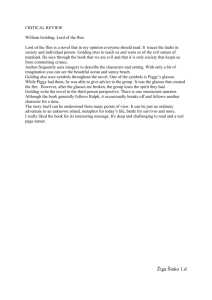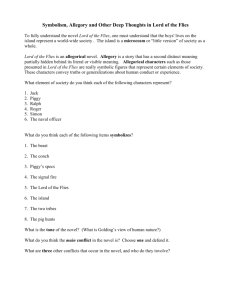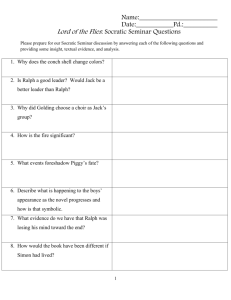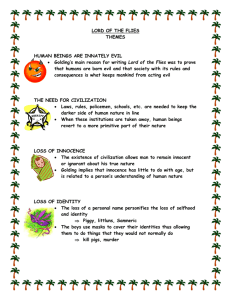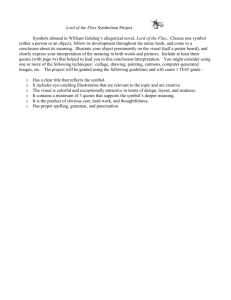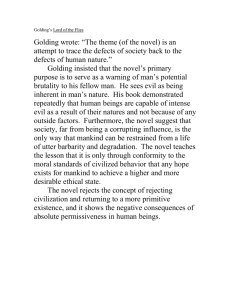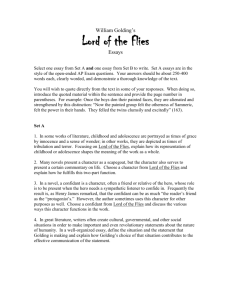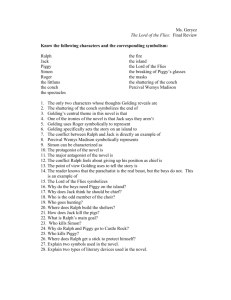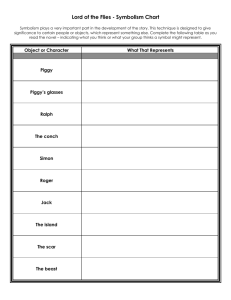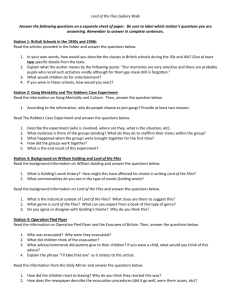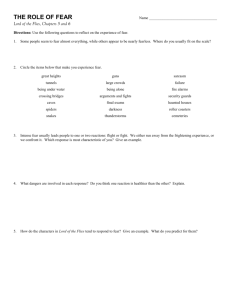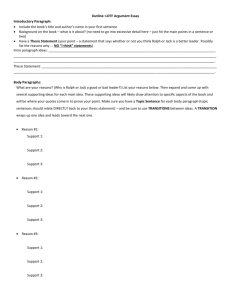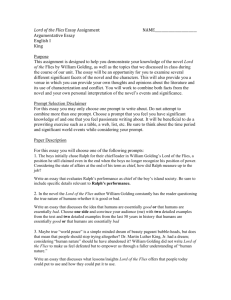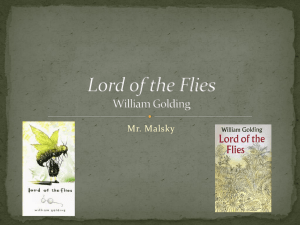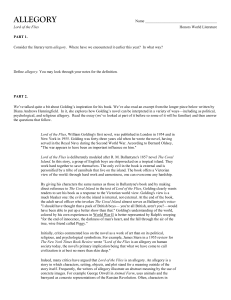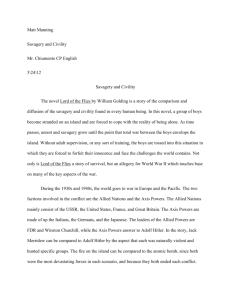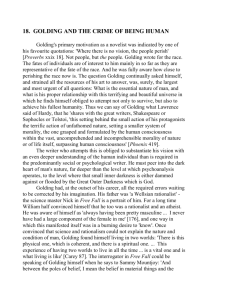Lord of the Flies
advertisement
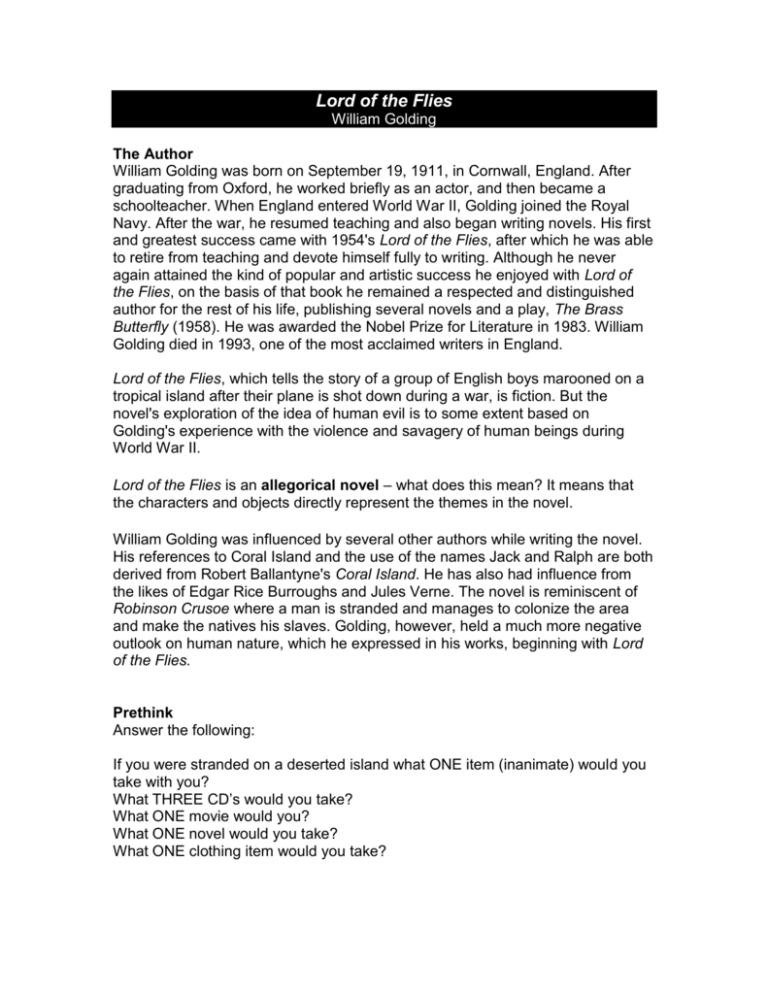
Lord of the Flies William Golding The Author William Golding was born on September 19, 1911, in Cornwall, England. After graduating from Oxford, he worked briefly as an actor, and then became a schoolteacher. When England entered World War II, Golding joined the Royal Navy. After the war, he resumed teaching and also began writing novels. His first and greatest success came with 1954's Lord of the Flies, after which he was able to retire from teaching and devote himself fully to writing. Although he never again attained the kind of popular and artistic success he enjoyed with Lord of the Flies, on the basis of that book he remained a respected and distinguished author for the rest of his life, publishing several novels and a play, The Brass Butterfly (1958). He was awarded the Nobel Prize for Literature in 1983. William Golding died in 1993, one of the most acclaimed writers in England. Lord of the Flies, which tells the story of a group of English boys marooned on a tropical island after their plane is shot down during a war, is fiction. But the novel's exploration of the idea of human evil is to some extent based on Golding's experience with the violence and savagery of human beings during World War II. Lord of the Flies is an allegorical novel – what does this mean? It means that the characters and objects directly represent the themes in the novel. William Golding was influenced by several other authors while writing the novel. His references to Coral Island and the use of the names Jack and Ralph are both derived from Robert Ballantyne's Coral Island. He has also had influence from the likes of Edgar Rice Burroughs and Jules Verne. The novel is reminiscent of Robinson Crusoe where a man is stranded and manages to colonize the area and make the natives his slaves. Golding, however, held a much more negative outlook on human nature, which he expressed in his works, beginning with Lord of the Flies. Prethink Answer the following: If you were stranded on a deserted island what ONE item (inanimate) would you take with you? What THREE CD’s would you take? What ONE movie would you? What ONE novel would you take? What ONE clothing item would you take? Personality Analysis Go to http://www.advisorteam.com/temperament_sorter/register.asp?partid=1 Take the test but do not order the results. Once you know what type you are, go back to the home page and read about the personality type. How accurately does it describe you? What are the four personality types (temperaments) listed? Give a brief description of each personality type with examples. Where do you think Jack, Simon, Ralph, Piggy and Roger fit? Explain why. Character & Symbolism Ralph – Anglo-Saxon means counsel Piggy – Wild Pigs hunted on the Island Jack – Hebrew means one who supplants Simon – Hebrew means listener Roger – Germanic means spear Notice the Germanic name having the negative connotation while the AngloSaxon is positive. Symbolism plays an important part in the development of the plot in the novel. This narrative technique is used to give significance to certain people or objects, which represent some other figure. Person and Object Piggy and his glasses Ralph and the Conch Simon Roger Jack The Island The Scar The Lord of the Flies The Beast Represents Themes William Golding presented numerous themes and basic ideas that give the reader something to think about. In his own words The theme is an attempt to trace the defects of society back to the defects of human nature. The moral is that the shape of a society must depend on the ethical nature of the individual and not on any political system however apparently logical or respectable. The whole book is symbolic in nature except the rescue in the end where adult life appears, dignified and capable, but in reality enmeshed in the same evil as the symbolic life of the children on the island. The officer, having interrupted a manhunt, prepares to take the children off the island in a cruiser which will presently be hunting its enemy in the same implacable way. And who will rescue the adult and his cruiser? Simplified the themes are: There is a fine line between civilization and chaos. Morals come directly from our surroundings, and if there is no civilization around us, we will lose these values. Other secondary themes include the following: People will abuse power when it's not earned. When given a chance, people often single out another to degrade to improve their own security. You can only cover up inner savagery so long before it breaks out, given the right situation. Loss of innocence Fear of the unknown Power and Control Discussion Questions Defend and/or criticize Ralph’s actions as leader. What were his motivations? Did he contribute to the tragedy in any way? Could he have acted to prevent any of the deaths? What would you have done differently in his situation? Do you think that taking a group of kids from a country whose government is not modeled on a democracy would be able to form a democratic form of government (knowing about a democratic form of government) or would they model the same type of government they live under? Why do you think democracy fails on the island? Do you think in this type of situation that dictatorship makes more sense and has a better success rate? Why? Reality shows like Survivor and Kid Nation attempt to recreate the “stranded on a deserted island” situation. Why do you think this is so appealing to the modern audience?
